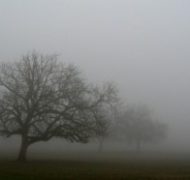When Your Work Isn’t Working
Blog / Produced by The High Calling
Twice in my life, I’ve found myself in work situations that were what I call my "wilderness years." Those are those perplexing, maddening, frustrating, depressing times when there’s either no work at all, or when your skills and talents are being seriously underutilized.
One of those times was when I was laid off. I was so discouraged by corporate life that I became an independent consultant for almost four years. I was able to work for a lot of companies in those four years, but I "belonged" to none of them. It wasn’t easy. I’m not a salesman and any consultant has to be selling at least 50 percent of the time, if not more.
The second time was a situation where I was underutilized. I knew it; a lot of people around me knew it. There were reasons, not good ones, perhaps, but at least explanations. Still, it was hard. So much I knew, so much I could contribute, so many repeated mistakes I could help people avoid – and it all had to go by the wayside because the scope of my work had narrowed drastically.
While they were very different situations, they shared some things in common, and there were lessons for me in the commonalities.
Both situations were preceded by intense organizational politics. All organizations have politics, because all organizations have people. I won’t call what went on "active persecution;" that seems too strong. But some milder version probably would describe what happened.
Both situations involved people who felt threatened, and especially by creativity and innovation (and not just mine). Organizations have strange rationales for promoting people sometimes, a kind of "Super Peter Principle" by which people keep getting promoted far beyond their capabilities. As in, the promotions should have stopped two or three positions ago. Or never happened at all. Or "we put you in this position because we didn’t know what else to do with you."
And both situations involved people who ended up leaving the organization. I could measure the damage they did to me; the damage they did to their organizations went far beyond the effects on one individual.
In both cases, I was left wandering around the wilderness. It’s a terribly lonely, unsettling feeling. Days seem off; what you thought you were about is definitely off. It’s as if your normal human center is off-kilter.
By the time my wilderness years arrived, I was old enough to know that there was a purpose, a purpose I could look for, and likely some things I needed to learn.
I learned to listen, and listen hard, and not just to what people said but also to what they didn’t say. I learned to rethink and reinvent what I was about, to learn new things, to take some different kinds of risks. In other words, I had an opportunity to grow, and to grow in unexpected ways. (A friend once called me the poster child for continuous learning, and that’s not a bad thing.) I also prayed more. And I read a lot about the life of David, understanding him in a way I might never have otherwise. And good things happened.
Example: online communications. I am absolutely the wrong demographic to "get" online communications like social media. I was born and raised in the printed word. I used typewriters for 15 years before desktop computers arrived with word processing. For two different companies, I worked in a "speechwriters’ ghetto" for several years, and it’s a ghetto with its own culture, language and often general snootiness. (Speechwriters’ ghettos are also almost non-existent today.) So by training, background and inclination, not to mention age, I should have been the last person to embrace online media.
And yet I did. It was one of the things I studied and experimented with and pondered during my wilderness years. It wasn’t only "getting " Twitter and Facebook; it was also a rethinking of how I broadly understood organizational communications, even going so far as to reject notions of "audience" and "message" as relics of the age of mass communication, relics that needed to be forgotten. (There are a lot of people in organizational communications 20 and 30 years younger than I am who still don’t grasp the shift that’s occurred.)
Had I not had that time in the wilderness, I more than likely would have been too busy with the crisis of the moment to have been given this opportunity to rethink and reinvent.
My wilderness years, as difficult as they were, were a gift.
Have you experienced a time of wilderness years at work?
What were you able to learn?
Post by Glynn Young.
Photo by nAncY. Used with permission.





